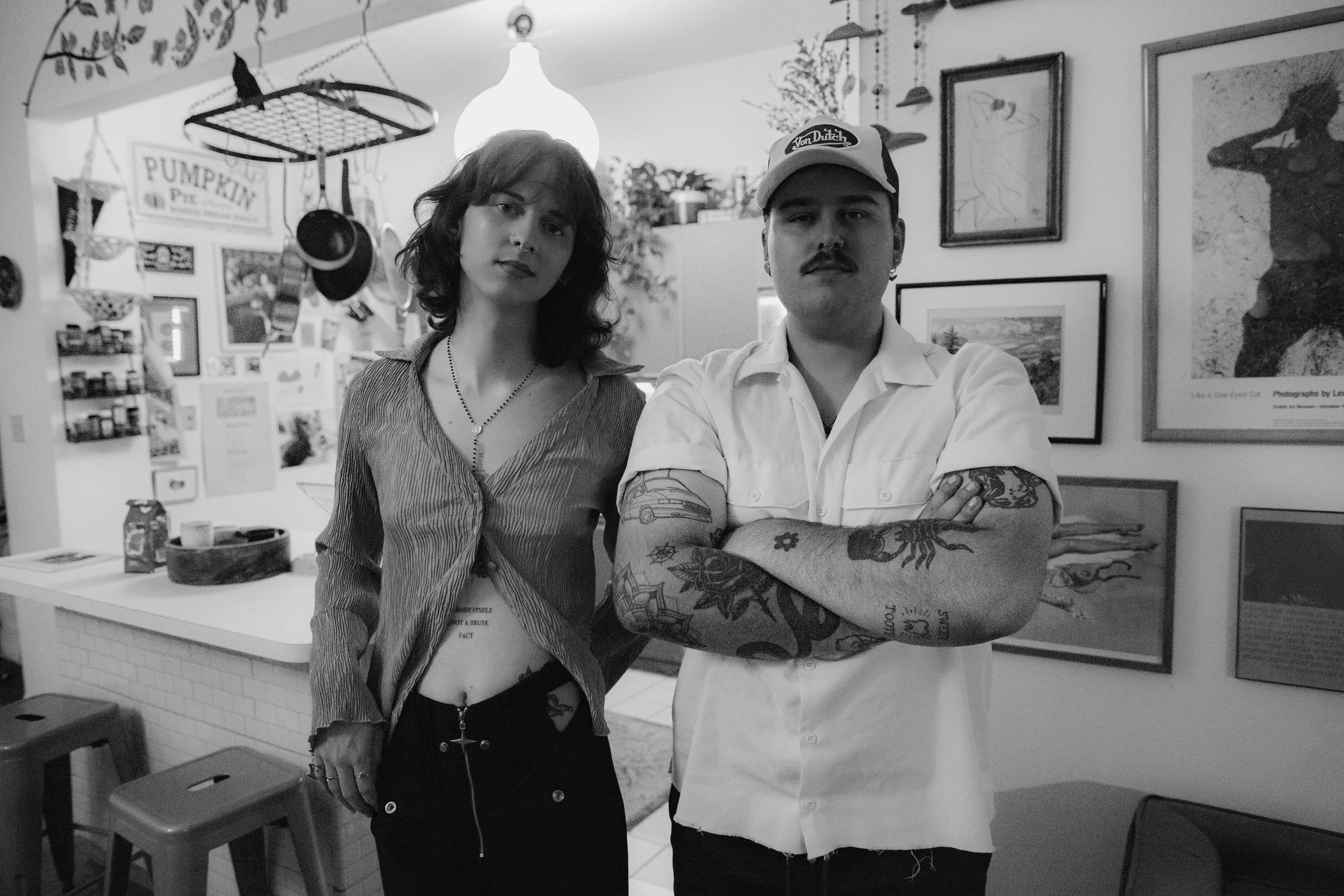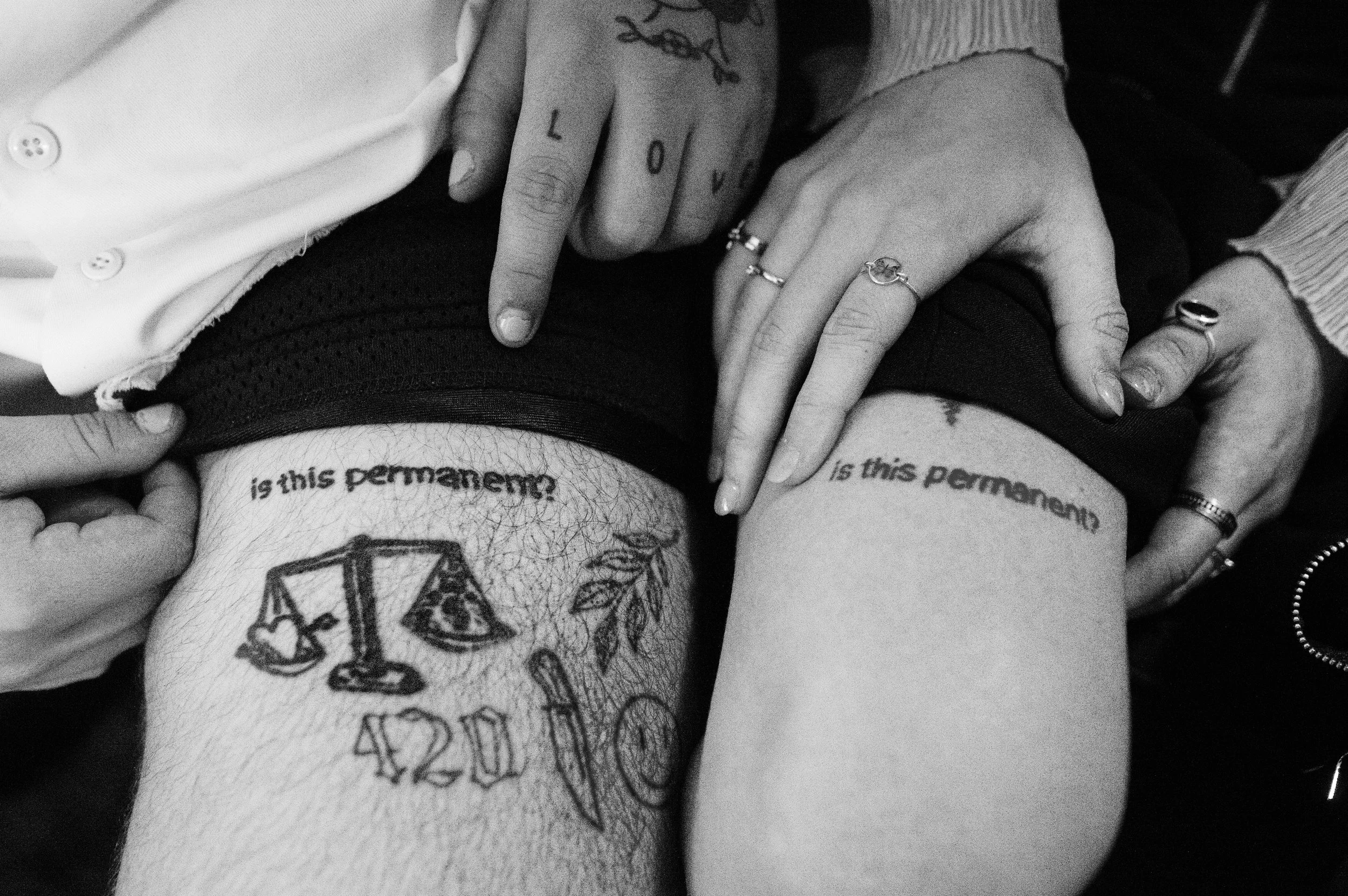Jae & Alec
Born 2000 / Studio Assistant
Born 1998 / Photographer, Social Media Marketing Strategist
I met Jae and Alec to talk about tattoos and their tattoo-inspired theses, “Desire Has No History” and “Life and Six Months,” which debuted in the Pratt Institute ARC Gallery in 2022. They were both photographed and interviewed in the fall of 2023. You can see more of their work on instagram, @j.grumulaitis and @alecilstrup, respectively.
[TAPE CLICKS ON]
DVW: The reason that I decided to pick both of you for this project was because you had really pertinent theses and I was wondering if you would be comfortable telling me about your thesis projects and why they ended up working so well together.
ALEC: I haven’t talked about this in a while. When deciding on my thesis, I was caught up in, “I need to capture my life because I'm young and I'll never be this young again,” and stuff like that. But I needed to do that without the project being cliche. What helped me sort of move forward artistically was tattoos, I guess, and making work about the different forms of mark making historically. I could document my tattoos without it being so cliche. So I did a lot of research into the history of tattoos, but also the history of the preservation of tattoos for my thesis project.
DVW: And what about you Jae?
JAE: I think my thesis was less centered around tattoos specifically, but more on the history of Queer spaces and how they've been built on top of another history always in New York City. A cruising ground will end up being a poet's space, and later it will end up being a Wendy's. So I was really interested in that merging of histories in New York. I started thinking physically and aesthetically about the compression of time shown through installations. I started working with historical records, archives, and collaging them into temporary installations around the city in specific places, some of those I would be in the photos. One of the things I started noticing throughout the year of making this project was this rapid change in my body, both in how I was presenting, but also the way I claimed parts of my skin with tattooing. By the end of the year I had gotten like 30 tattoos, which is crazy to think about. A lot of them were being done by Alec, and I think we bonded both over the self-claim to your skin, the kind of absurdity of being okay with something that's like, not perfect, tattooed forever. It captures what my artistic practice was about, at that specific moment in time. That's where I think our joint piece, “Is This Permanent?" happened.
ALEC: It hit on the intersection of our projects. Our work in general was about claiming space in the world, this sort of… customizable nature of our bodies as humans. I was thinking a lot about “The Queer Art of Failure.” That book touches on how tattoos and changing your skin and body modification are all inherently gay, anti-establishment, anti-fascist statements in a way. We were both interested in that. Our projects were both about changing your outward appearance to match your internal [feelings], which is also Queer.
DVW: You know, in my interviews, a lot of people have talked about tattoos as a way of controlling or claiming something. But I don’t think I’ve yet talked with anyone about it in relation to the Queer identity. Thank you for bringing that up, because there’s such a long, complicated history there, you know. Tattooing was made illegal in New York in 1961, and a Hepatitis outbreak was used to justify the ban for the longest time. But it wouldn't surprise me if a lot of the reason tattooing was kept illegal was because of the AIDS crisis. And I think, for that reason, tattoos and needles, especially, had a negative connotation attached to them when associated with the Queer body. But now, Queer people are far, far more likely to adorn tattoos than straight people. There’s a sort of reclamation there, turning a negative stigma into a positive identifier. I was wondering if either of you would be comfortable talking about how your tattoos relate to your Queer identities?
JAE: I mean, every time I get a tattoo, I feel more confident in my body. I think, I'm sexy.
DVW: It’s affirming.
JAE: But sometimes, it feels like a form of flagging me as Queer, which is weird. I have a lot of random tattoos, some of them are so silly. That’s something that a lot of people and I joke about. They’re so silly, and careless, and permanent. In a way, it's me actually letting go of my obsession over controlling my body. And I think that's a healthy thing.
DVW: So for you, tattoos are actually a way of releasing control. That’s fascinating. You’re not worried about regret?
JAE: I wouldn’t trade them for the world. And I’m sure I’ll get more stupid tattoos… I mean, I’m a trans person, and my first tattoo was a Harry Potter tattoo.
[ COLLECTIVE LAUGHTER]
JAE: So I have thought about covering it up. But I think I’ll keep it, because it's kind of funny. Like, wow, I didn't really know anything about myself at that time. But no, it’s a silly reminder, I don’t think I’ll get it covered up.
ALEC: I agree with that sentiment. It’s such a white boy thing to get a tree silhouette on your forearm [motions to tree silhouette tattoo on forearm]. Luckily, I didn’t get the kind that goes all the way around [the arm]. When I got it, I got it because it was a reminder of home for me, the Pacific Northwest. I still like that reminder. But would I get it now… probably not.
JAE: Something else about tattoos that’s so special though is the bond you make with other people. I love talking with Alec about the tattoos he’s done [on me]. And thinking about people that’ve tattooed me. I like looking down at my body and thinking, “This tattoo was done by the scary bearded man. I didn't say a word for four hours.” And looking at my other tattoos and remembering those people.
DVW: Thats interesting. When you look at your own body, you see several people on it, their marks on you at least. A bit ironic, multiple identities on oneself. I think there’s an obvious parallel there.
JAE: Ha. Yeah. Another thing that's so crazy, and it’s such a Brooklyn thing… I've had people say, “Oh my God, is that a salami_mommi tattoo on your arm?” And I'm like, wow, we're referring to a tattoo artist by their Instagram handle right now. This is really happening.
ALEC: Yeah, I was at a bar in Bushwick the other day and some guy was like, “Is that a Bruno Levy?”
DVW: That’s funny, several people have mentioned that username dropping [in previous interviews]. It's a bit uncanny in my opinion. On the uncanny— obviously, from your matching tattoos, I know you two have thought a lot about tattoos and permanence. Do you think permanence is a concern specific to this generation, because of unique problems like climate change, et cetera, or do you think it's just something everyone worries about when they’re young?
JAE: I don’t know, I’ve definitely thought about permanence. I always thought I was gonna die [young], but now I’m twenty-three. So, like, there's still some time left… but it’s weird to consider that one day I could be thirty-five. Like I’m actually an adult now. That may be something we’re more aware of…
DVW: Our generation, perhaps we don’t take the future for granted as much, because it’s so uncertain, not promised.
JAE: Maybe that's what encourages me to be a little too reckless with what I put on my body.
ALEC: Instability and uncertainty is definitely a part of it. And stigma being lifted. And accessibility and the rise of buying supplies on Amazon. There’s going to be so many studies, I’m sure there already are some, on this generation. It’ll be crazy to see how it all ends up, how we all end up.
[TAPE CUT]


